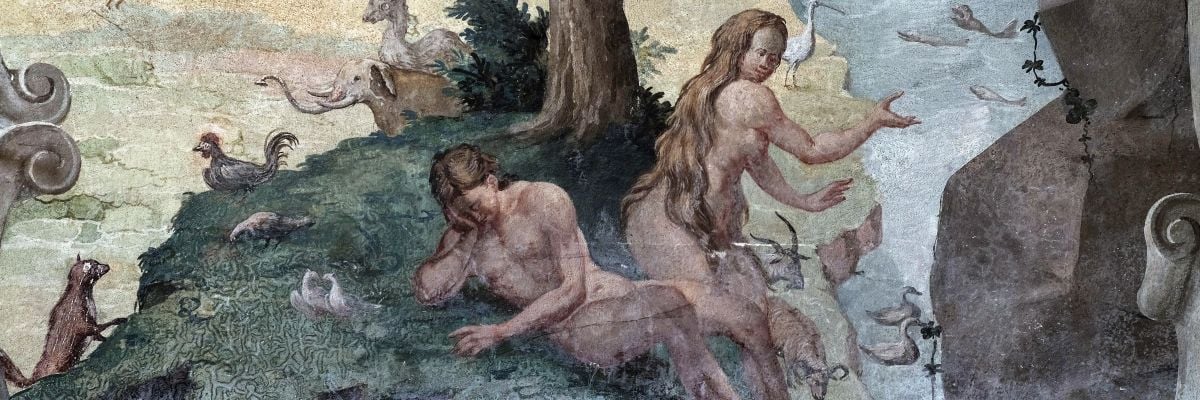
Someone recently wrote to me asking, “Christians believe that death entered the world through sin. Check out Romans 5:13-14 if you don’t believe me. Yet evolution proves that death existed before the fall. How do you explain that?”
This is a great question, one which I suspect many Christians haven’t given much thought.
In this post I’d like to argue, from the book of Genesis, that death did indeed exist before the Fall—the death of animals and plants—and that when the Bible speaks of death entering the world through sin (as in Romans 5), it’s talking about human death. But first, let’s take a look at the passage in question:
Therefore as sin came into the world through one man and death through sin, and so death spread to all men because all men sinned—sin indeed was in the world before the law was given, but sin is not counted where there is no law. Yet death reigned from Adam to Moses, even over those whose sins were not like the transgression of Adam, who was a type of the one who was to come (emphases added).
As you can see, Paul’s focus here is on death spreading to men. He’s not talking about the death of animals or plants. Before we look at each of those, let’s take a look at why Adam and Eve were originally intended to be immortal in the first place.
The Tree of Life
The second chapter of Genesis seems to suggest that the tree of life, which was in the midst of the garden (Gen. 2:9), was the means by which Adam and Eve were to live forever. God had given them permission to eat from that tree, since he said they “may freely eat of every tree of the garden” (Gen. 2:16)—except for the tree of the knowledge of good and evil.
By losing access to this tree through original sin, man lost the opportunity to live forever. In Genesis chapter three we read that God drove him out of the Garden of Eden, “lest he put forth his hand and take also of the tree of life, and eat, and live forever.” It then says that God placed “cherubim, and a flaming sword which turned every way, to guard the way to the tree of life.”
Animals
Okay, if the tree of life was necessary for Adam and Eve to live forever, one might reasonably ask, did animals have access to the tree of life? The answer seems to be no.
If the tree of life was unique, it might have been enough for Adam and Eve to eat from, but it would never have been enough for all of the animals of the world to eat from. This may be another sign that the animals were not understood to have the tree of life for their food. If so, then the text of Genesis itself would suggest that, while man was meant to be immortal, animals were not. That would support the idea, based on St. Paul’s statement, that it was human death that entered the world through the Fall, not animal death.
Furthermore, we should note that giving “every green plant” to animals as food does not mean that some of them weren’t also carnivores. It’s not as if, before original sin, lions ate dandelions and toadstools and only afterward did they begin picking on poor old wildebeest. This is something Thomas Aquinas wrote about in his Summa Theologica:
In the opinion of some, those animals which now are fierce and kill others, would, in that state, have been tame, not only in regard to man, but also in regard to other animals. But this is quite unreasonable. For the nature of animals was not changed by man’s sin, as if those whose nature now it is to devour the flesh of others, would then have lived on herbs, as the lion and falcon.
(We should add, lest anyone be tempted to think that this is a forced retreat in the face of modern evolutionary theory, that Thomas wrote these words nearly 550 years prior to the birth of Charles Darwin.)
Plants
What about plants? Is there evidence in Genesis to suggest that plants died before the Fall?
My colleague Jimmy Akin addressed this in a recent post of his:
We can go even further, though, because of God’s permission to eat fruit. That means death. Specifically, the death of the fruit’s flesh (and its seeds, if those get chewed up, too).The fruit’s flesh (and its seeds) are alive. They’re made of living cells.
The seeds are even little fruit embryos, which makes them independent organisms. Of course, they aren’t human. They aren’t rational beings, so they don’t have rights or a right to life, and it’s okay to eat them. But they do die when we eat and digest them. The same thing is true of other plant matter we eat. So we have reason to think, even on a highly literal reading of Genesis, that there was plant death before the Fall.
Of course, there is the question of how literally the details of this text should be taken. The Catechism of the Catholic Church notes that the early chapters of Genesis contain symbolic elements:
The account of the fall in Genesis 3 uses figurative language, but affirms a primeval event, a deed that took place at the beginning of the history of man. Revelation gives us the certainty of faith that the whole of human history is marked by the original fault freely committed by our first parents (CCC 390).
But even if you take some of the details very literally, it still looks like animals and plants died before the Fall—consistent with the findings of modern science.
If you liked this post, you might also enjoy: Evolution Vs. God? & Evolution Vs. Genesis?



